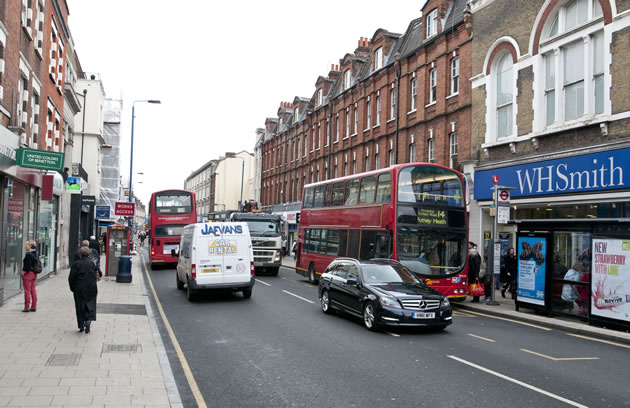Low emission buses and day-time delivery ban believed to be reason

|
Initial results from the council’s air quality monitoring stations at seven sites across the borough show a drop in harmful pollutants, suggesting that air quality is improving for residents.
In Putney mean levels of nitrogen dioxide (NO2) measured on the High Street kerbside monitoring station were 66 micrograms per cubic metre. In 2017 the figure was 76.
There was also a fall in the number of hours NO2 levels breached EU guidelines, from 76 to 25. The fall is even starker when compared to 2016, when there were 1271 breaches. The majority of these breaches occurred during the morning rush hour.
Previous research carried out by the council showed that buses were a large contributor to pollution in Putney. Last year Putney became the capital’s first low-emission bus zone. The council also introduced a daytime delivery ban for lorries and is currently working with TfL to improve traffic flow down Putney High Street.
These figures will now be sent for checking by independent auditors and will form part of the council’s annual report on air quality submitted to the Greater London Authority later this year. All London boroughs have to submit an annual report on air quality to the Greater London Authority (GLA). In Wandsworth air quality is measured at seven sites across the borough.
Last year Wandsworth revised its five year Air Quality Action Plan, with a further 50 actions to reduce pollution levels, including measures to reduce pollution from council vehicles and buildings, promoting greener travel to staff and embedding air quality in all aspects of the council’s work, including procurement and planning.
The council is working closely with the construction industry to reduce pollution from building sites. It has a dedicated construction site compliance officer inspecting sites, and an air quality officers working with the whole Nine Elms community, including schools.
Reducing pollution around schools is a key aim. Enforcement officers have been trained to issue fixed penalty notices to drivers who leave their car engines idling and officers have visited schools and talked to parents to persuade them not to leave engines running at pick-up and drop-off time.
Three Idling Action Days are planned for later this month and in March, and Wandsworth is seeking volunteers willing to help out. You will need to spare around two hours on each day. If you can help visit idlingaction.london/volunteers.
The council’s transport and air quality spokesman Jonathan Cook said: “I’m delighted that for a third year running air pollution levels appear to have dropped dramatically, especially in Putney. Our close and increasingly joined-up focus on this issue, together with effective working with partners such as TfL, has certainly paid off. We will also continue to make it easier for people to choose greener travel, such as electric cars and would encourage people to use more active methods of travel such as walking and cycling whenever they can.
“We will continue to work hard to reduce pollution levels still further, and are keen to work with the local community to help achieve this. Please get in touch if you can help with our anti-idling work outside schools.”
Measures taken to improve air quality include:
• Recruiting and training air quality champions.
• A rolling programme of environmental theatre productions in local schools to teach children how their travel choices affect air quality.
• Supporting Clean Air Day and encouraging local people to make clean air pledges
• Helping schools develop School Travel Plans which reduce the number of cars used on the school run through initiatives like 'walking buses' and car pools.
• Championing car clubs which dramatically reduce total vehicle use and take older, more polluting cars off the road. Wandsworth now has the highest car club membership in London with more than 20,000 members.
• Providing a comprehensive network of electric vehicle charging points. By the middle of 2019, Wandsworth will have around 500 charging points including many using existing infrastructure such as lampposts. This is one of the highest number of charging points in any London borough.
• Promoting cycling and investing in the borough’s cycle network. Wandsworth now has the fastest growing cycling rate in the country according to Government statistics.
• Free bike safety lessons for children and adults to give more residents the confidence and skills they need to start cycling.
• Introducing a borough-wide 20mph speed limit.
• Restrictions on delivery vehicles in busy high streets
• A free airTEXT messaging service warns residents when high pollution levels are forecast.
• Lobbying for higher capacity rail, bus, riverbus and tube services so more residents can switch from cars to public transport.
February 22, 2019